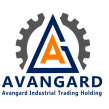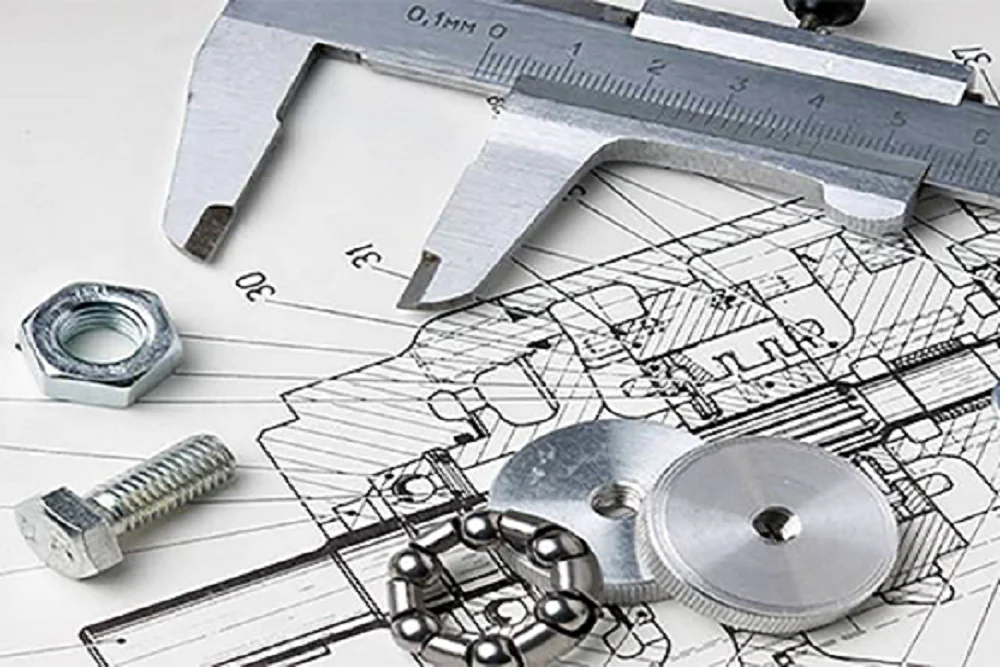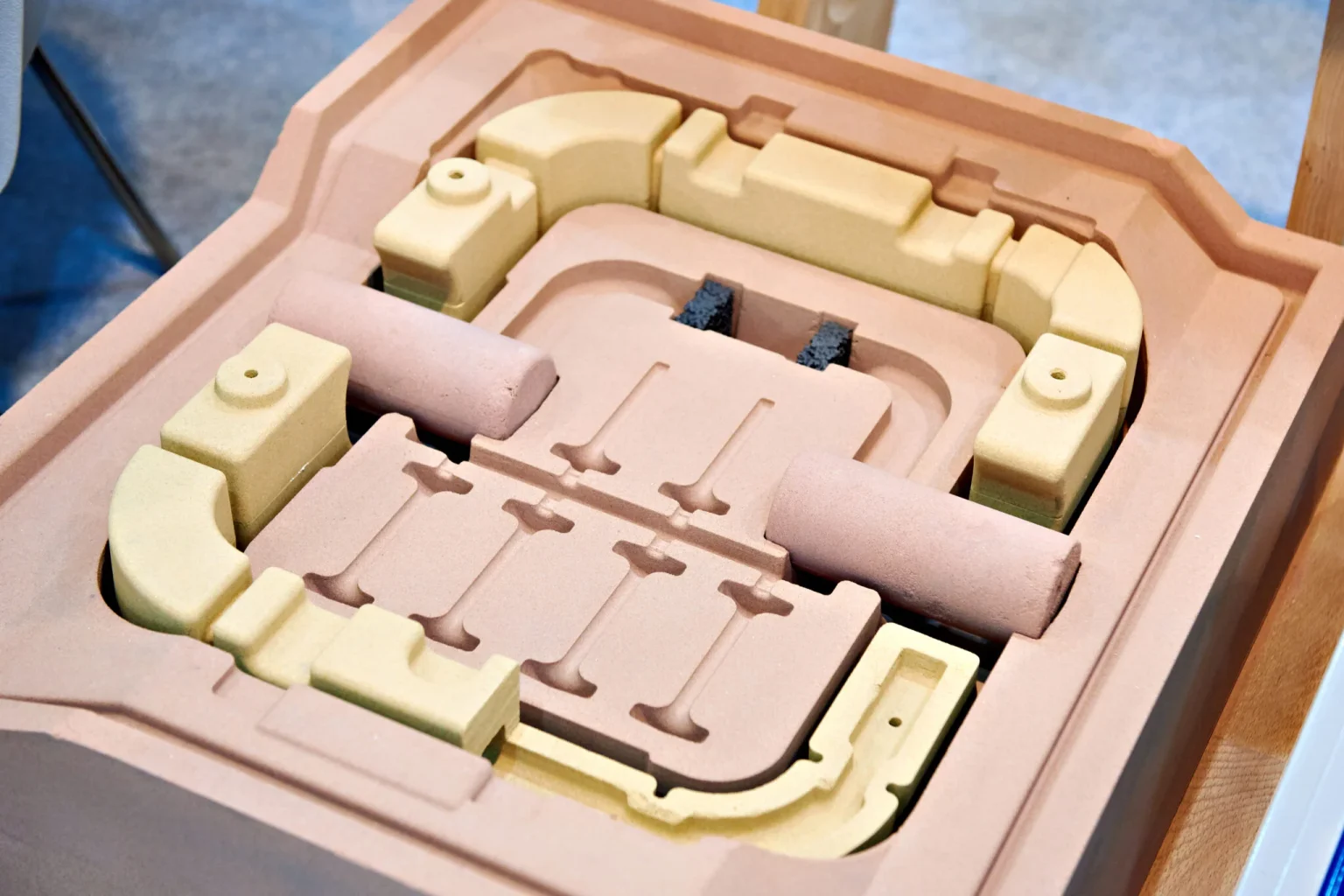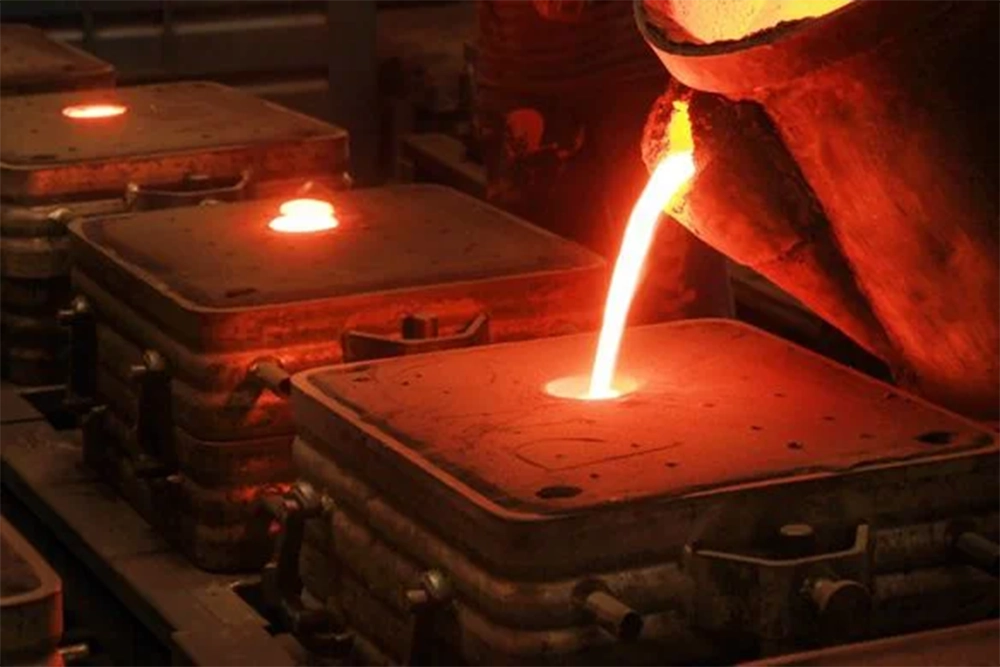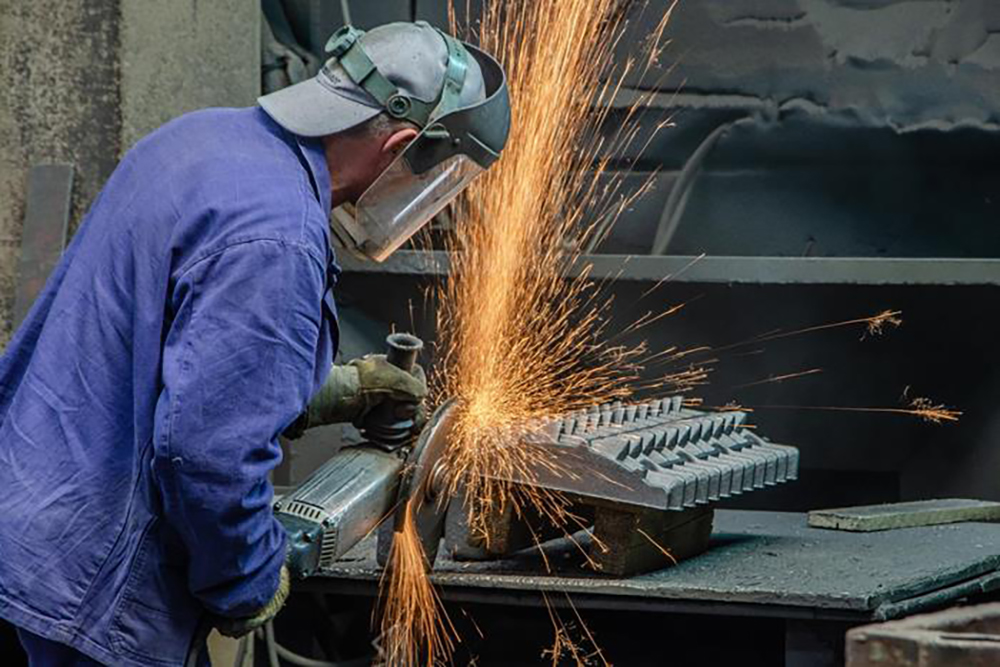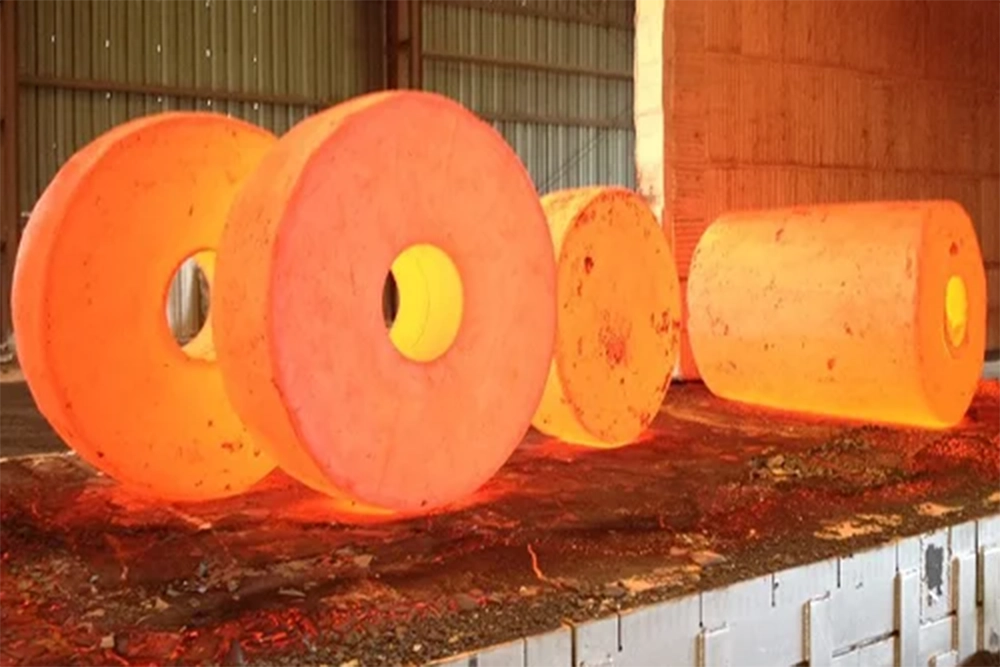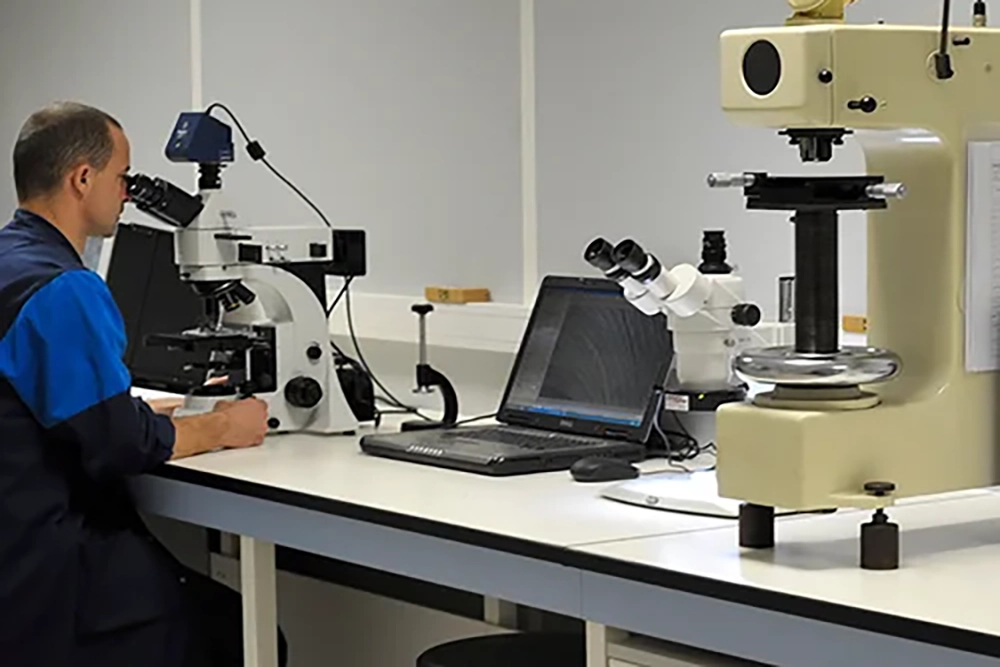Metal casting
Casting is a method of shaping metals and alloys by melting them, pouring the melt into a chamber called a mold, and then cooling and solidifying it according to the dimensions and structure of the mold chamber. Types of casting are the oldest known process for obtaining the desired shape of metals; hence, the casting profession has a long history in the industry.
At Avangard, we use high-quality alloys and precise compositions, utilizing various casting methods in a specialized way to produce cast parts in the production of various alloy steels and cast irons and non-ferrous alloys. We ensure that the parts are produced with superior mechanical properties and high durability, meeting your esteemed standards. Our production process is carried out under strict supervision and quality control to always provide the best products to our customers.
Cast parts produced in casting factories and casting workshops have various applications, including in the automotive industry, electronics industry, oil and gas industry, crusher and sand and gravel mining industries, and other manufacturing industries. Considering the diverse needs of customers and updating the knowledge and experience of Avangard company engineers, through research on casting and familiarity with various standards and casting terminology, we are committed to providing customized and high-quality solutions.
Avangard Company, with an experienced and specialized team of graduates from top universities in the country and abroad, is always striving to provide casting services in the best possible way to its customers and gain their satisfaction by continuously improving processes and using the latest technologies.
Casting Design and Modeling
Design and modeling is a complex process that requires high knowledge and experience…
Molds are made with sand, which using pressure, the shape of the model is…
Melting in Casting
To reach the desired final standard, electric furnaces are used for melting iron and ...
Solidification in Casting
The molten material is poured into the mold, and depending on the alloy of the part, time is given to...
Cutting and Cleaning in Casting
After solidification, the cast pieces are removed from the sand molds by vibration, and then after that they need to be ...
Heat Treatment in Casting
To achieve desirable and good mechanical properties and to eliminate residual stresses, the parts are heat-treated...
Laboratory and Quality Control in Casting
The parts are thoroughly tested for dimensions, mechanical properties, and required tests before delivery...
Casting Products
Production of parts for sand and gravel mines, oil, gas and petrochemicals, power plants and industries with different alloys from ...
Avangard Holding is proud to rely on more than two decades of experience and high academic education from reputable universities inside and outside the country, as well as casting and production of more than ten thousand parts, including parts for machine-building, automotive, mold-making, oil, gas and petrochemical industries, power plant industries, cement and mineral processing industries with alloys such as carbon steel groups, low-alloy, heat-resistant (steel and refractory), manganese (Hadfield), high-chromium, and also chromium cast irons. We are also capable of producing parts based on specific analysis, standards, and desired characteristics, with modeling, molding, melting and cleaning equipment, modern laboratories for quantometry, ultrasonics, wet chemistry laboratory, metallography and mechanical properties, along with a design and engineering unit equipped with an active simulation program, at your service, esteemed industrialists. We offer the best and highest quality casting services at the most reasonable prices to you, dear customers.
History of Casting
Casting is one of the oldest manufacturing processes in human history, which has been used in various cultures and civilizations for thousands of years. Throughout history, this process has been used by people as a method of producing metal and non-metal parts. Below is a summary of the history of casting:
1-Historical Background: Casting was first discovered in ancient times by ancient humans. The first castings probably used clay or other viable materials such as wax to produce simple parts.
2-Casting in Ancient Times: From ancient periods, such as ancient Egypt, Sumerian, ancient Greece, and ancient Rome, there is evidence of the use of casting for the production of tools, weapons, decorations, and metal parts, etc. During this period, methods such as pouring into clay or stone molds were often used.
3-Casting in the Middle Ages: In the Middle Ages, casting improved, and more complex methods such as casting with lead and bronze were used in the Roman empires, etc.
4-Casting in the Modern Era: With the advancement of science and technology, casting developed into a more advanced and industrial form. Since the beginning of the industrial era, various types of casting have been invented for the production of various parts in various industries, including ferrous metal casting, steel casting, non-ferrous metal casting, sand casting, plastic casting, and more.
5-Casting Today: Currently, casting is one of the main methods of producing industrial parts. Casting industries are used in the production of components for automobiles, electronic devices, medical tools, aerospace, and household items to parts for wharf construction, building components, oil and gas valve industries, industrial machinery, defense industries, and automotive, and other industries. Also, with the advancement of technology, methods such as precision casting, centrifugal casting, and gravity casting have emerged, which improve the casting process.
In summary, casting has been one of the main production processes in human history, which has improved from ancient times to the present with the advancement of science and technology and the construction of casting tools, and is used in various industries.

How Casting Services Are Performed
1- Reverse Engineering: By carefully examining existing parts, we introduce improved designs.
2- Surveying: We gather accurate information and required dimensions and use them to design and build molds.
3- Design: We provide innovative and accurate designs for your required parts.
4- Drafting: We prepare accurate and comprehensive technical engineering drawings for the construction of parts.
5- Modeling: Using advanced software, we create accurate 3D models of your parts, and then we will proceed to build models from aluminum, wood, polystyrene, or foam, and other conventional casting models based on the number of orders and production sensitivity of the part.
6- Technology Design: By utilizing superior technologies and more than two decades of experience in the production of cast parts, we optimize and make production processes more efficient, and introduce a suitable gating and feeding system for the part and alloy.
7- Simulation: Using advanced simulation software such as ProCAST, sut cast, etc., we improve the performance of casting processes.
8- Molding: We produce precise and high-quality molds for casting your parts.
9- Assembly: We connect and integrate the cast parts to form the final product.
10- Laboratory: In the casting factory, to evaluate the quality and properties of materials and cast parts, with the help of the advanced metallurgy laboratory unit, the entire process is controlled by Avangard’s metallurgical engineers.
11- Melting and Pouring: With precise alloying, with the help of advanced quantometry laboratories, according to the request of our dear customers, we adjust the range of alloy elements of the melt, carefully add the casting materials to the melt, and after re-adjusting and confirming the range of elements and reaching the desired melting temperature, the molten metal is poured into the molds and the casting process is performed.
12- Solidification: We cool the cast parts precisely to reach their final shape.
13- Cutting and Cleaning: We cut the excess casting, including the gating system, etc., from the cast parts and perform the necessary cleaning operations such as shot blasting, etc., on them.
14- Heat Treatment: We perform heat treatment operations such as heating, annealing, quenching, normalizing, etc., to improve the mechanical properties of the parts.
15- Quality Control of the Produced Product: We carefully control the quality of the products and ensure that the products comply with international standards.
16- Transportation and Delivery of Parts and Products: We ship the parts and products to their final destination, adhering to safety standards and with high quality.

What are Casting Services?
Casting services include the process of producing metal or non-metal parts by melting metals and casting raw materials in melting furnaces such as induction furnaces, electric arc furnaces, hearth furnaces, and other casting melting furnaces. These services include stages of design and reverse engineering of parts, selection of suitable materials, preparation of patterns or molds, casting of crusher and road construction parts, extraction, heat treatment, and finally quality control and various tests to ensure the quality and accuracy of the produced parts.
Advantages of the Casting Process
The casting process has several advantages, which include the following:
1. Possibility of producing parts with different shapes and sizes: Casting allows the production of parts with various shapes and sizes, from simple to complex, and by using suitable types of casting molds, parts of any shape and size can be produced.
2. Economic efficiency in cost: The casting process, because it is able to produce parts in mass and with modern technologies, can reduce production costs.
3. Possibility of using different materials: Casting allows the use of various materials, including metals, various ferroalloys, etc., and helps to produce parts with different properties and characteristics, including resistance to heat, impact, and other environmental conditions.
4. Fast production schedule: Casting usually provides faster production methods, including pressure casting, centrifugal casting, etc., to produce parts in shorter times.
5. Possibility of producing parts with precise details: The casting process allows the production of parts with precise details and without the need for precise machining operations.
6. Possibility of implementing complex projects: Using casting, it is possible to implement projects with complexity and large size that are difficult to achieve by other methods.
In general, due to these advantages, the casting process has become one of the most important methods of producing industrial parts.

Providing Casting Services at Avangard Company
1- Specialized casting of various wear-resistant steels and cast irons, especially Hadfield steels (manganese steel) with different percentages of manganese and molybdenum and other useful elements, Ni-Hard 4 cast iron and high-chromium cast irons used for hammers, anvils, and liners of sand, gravel, and cement crushers, cost-effective cast iron with high quality.
It is worth noting that Avangard Company has extensive specialized experience in this group of alloys. The complete list of parts for crushing machines is provided in the products section, which will be offered to you with the best price and highest quality.
2-Casting of various carbon and low-alloy steels, including alloys of the GS group…, WCB, 42CrMo4 (Mo40), Gs – Ck45, surface-hardening steels such as 1.7131, and other cast alloys of this group of steels in accordance with ASTM A216, ASTM A217 standards, etc.
The above-mentioned steels are used in the oil and gas industries, machine-building industries, and railway industries.
3-Casting of various stainless steels, such as alloys 304L, 304, 316, 316L, Ni-Resist cast iron, and special alloys such as Duplex steel
In this field, there is experience in producing various parts of the body and impeller of water, oil, and gas pumps and the transport of acid or salt. It is worth mentioning that alloys containing Ti, Nb, N, V, and W have been frequently produced and delivered to esteemed customers in this company in accordance with the relevant standards for the production of valves such as ASTM A351 and ASTM A352.
4-Casting of various refractory steels such as alloys 1.4841, 1.4848, 1.4837, 1.4823, etc., used in high-temperature environments in the cement, oil, gas, and petrochemical industries.
5-Casting of various gray cast irons in different grades (GG) and ductile cast iron in different grades (GGG) in accordance with valid international standards such as DIN, ASTM, BS, etc.

Casting
Avangard Holding is proud to rely on more than two decades of experience and high academic education from reputable universities inside and outside the country, as well as the production of more than ten thousand parts, including parts for machine-building, automotive, mold-making, oil, gas, and petrochemical industries, power plant industries, cement and mineral processing industries with alloys such as carbon steel groups, low-alloy, heat-resistant (steel and refractory), manganese (Hadfield), high-chromium, and also high-chromium cast irons. We are also capable of producing parts based on specific analysis, standards, and desired characteristics, with modeling, molding, melting and cleaning equipment, modern laboratories for quantometry, ultrasonics, wet chemistry laboratory, metallography and mechanical properties, along with a design and engineering unit equipped with an active simulation program, at your service, esteemed industrialists. We offer the best and highest quality casting services at the most reasonable prices to you, dear customers.
Price of Casting Services
At Avangard Holding, with more than twenty years of experience in the field of casting, casting services are provided using the latest technologies and a specialized and experienced team. We are ready to cooperate in various fields of casting, including ferrous and non-ferrous metals, and specialized in the production of steel, cast iron, and non-ferrous alloys. The price of steel, the price of cast iron, and other cast parts vary depending on the type of service, dimensions of the parts, and materials used.
For more detailed information and to receive a price quote, please contact Avangard’s sales team. Our consultants are ready to answer your questions and provide suitable services for your needs.
Thank you for choosing to collaborate with Avangard Holding
Our words and actions are based on providing products and services that meet the needs, wants, and requirements of our customers and other stakeholders faster, better, with desired quality, and at a reasonable price. We think differently and continuously review and improve our performance in relation to our stakeholders, taking into account the close relationship with them.

Specialized design, production, and sale of components for sand and gravel mining crusher machines.
Avangard, utilizing skilled professionals and advanced production lines, has been able to provide all the requirements for manufacturing components for sand and gravel mining crushers within an integrated facility.

Design and production of custom industrial components.
The Avangard infrastructure provides a platform for the design and production of custom industrial components, with no limitations on dimensions, size, shape, or the alloys of the produced parts.

Foundry and commissioning of the new parts production line
The flexibility of Avangard’s parts production lines has enabled us to meet all customer needs with the highest standards.

Design, Production and Sale of Industrial Parts
Avangard is one of the best manufacturers of industrial parts, including for the machine building, automotive, mold making, oil and gas, and petrochemical, power plant, cement and mineral processing industries in the country.

Design and Construction of Models
Providing consultation by a specialized team, design and construction of models and molds with very high accuracy and reasonable prices for the production of industrial parts.

Casting of Parts
Casting with various temporary and permanent molds in low, medium and high volumes with automatic and manual production lines.
 فارسی
فارسی Arabic
Arabic